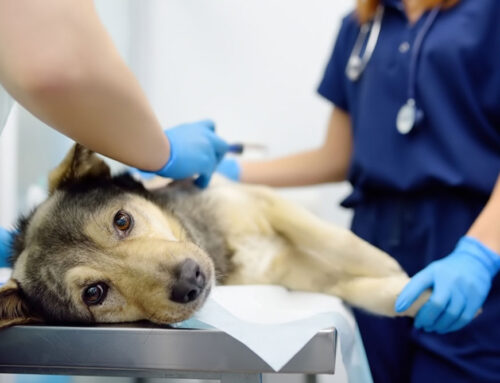A Memphis Guide to Chronic Pain Relief for Pets: Medical and Holistic Therapies
Midnight zoomies that once sent your cat skidding across the hardwood may now be replaced by long naps in quiet corners. The dog who never missed a chance to chase a squirrel might hesitate at the back door, unsure if the sprint is worth the ache in his hips. These subtle changes are often brushed off as “just slowing down,” but in many cases, they point to chronic pain.
At Southern Crossing Animal Hospital in Memphis, we know how easily these early clues can be missed. Our team is dedicated to uncovering hidden discomfort and building personalized plans that restore mobility, ease, and joy. By combining advanced medical care with holistic therapies, we help pets stay active and connected to the families who love them.
Why Pain Can Be Hard to Spot
Unlike people, pets rarely cry out when they hurt. Instead, discomfort shows up in subtle ways:
- Hesitating before climbing stairs
- Limping after playtime
- Resting more and playing less
- Licking or chewing at a single joint
- Hiding or acting withdrawn
Common conditions most likely to cause pain in pets include arthritis, dental disease, cancer, soft-tissue injury, and nerve pain. Because these conditions often progress quietly, families may not recognize the problem until their pet’s quality of life is significantly diminished.
Dogs may show stiffness or limp after activity, while cats are even more subtle. The Feline Grimace Scale helps veterinarians and cat owners evaluate pain through tiny changes in ear position, whisker angle, and facial tension- details that often go unnoticed at home without training.
That’s why twice-yearly wellness exams are so valuable for seniors. Our Fear Free–certified team makes visits calm and comfortable, allowing us to detect pain early and start relief before mobility is lost.
The Role of Diagnostics in Pain Care
How do we find pain when the cause isn’t obvious, or when we’re determining the best treatment options?
Accurate diagnosis is critical before beginning therapy. Our diagnostic imaging suite includes digital X-ray, ultrasound, and echocardiography to reveal joint disease, soft-tissue injury, or hidden cancer. For cancer detection, our screening program identifies masses early, when treatment is most effective.
The Four Pillars of Pain Management
Pain is complex, often involving inflamed joints, irritated nerves, tense muscles, and even emotional stress. The most effective care addresses all of these aspects at once. At Southern Crossing, our approach rests on four interconnected pillars:
- Targeted treatments
- Rehabilitation and physical therapies
- Integrative options
- At-home adjustments
1. Targeted Treatments
Our first goal is to remove or reduce the direct source of discomfort. Sometimes this means medication, while in other cases it requires dental work or surgery. Every plan begins with a full workup through our diagnostic laboratory, ensuring treatments are tailored to each pet’s overall health.
Medications
- NSAIDs are the cornerstone for arthritis and soft-tissue injuries, reducing swelling and stiffness when monitored with regular bloodwork.
- Gabapentin or amantadine ease nerve pain, post-surgical sensitivity, and chronic back discomfort.
- Monoclonal antibody injections such as Librela for dogs and Solensia for cats specifically block nerve growth factor (NGF), tackling osteoarthritis pain without taxing the kidneys or liver.
- Opioids and joint injections are reserved for severe cases, with careful monitoring to minimize side effects.
Surgical Solutions
In some cases, pain stems from a physical problem that cannot be managed by medication alone. Our surgical team performs both orthopedic and soft-tissue procedures, from cruciate ligament repairs to tumor removals. Pain control is integrated before, during, and after surgery for a smooth recovery.
Dental Care
Chronic oral pain is one of the most overlooked causes of discomfort. Infected teeth, gum disease, and feline resorptive lesions cause ongoing suffering even if pets keep eating. With full-mouth radiographs and advanced dentistry services, we uncover hidden problems and provide complete treatment, restoring comfort every time your pet eats.
By combining these targeted treatments with supportive care, we ensure pets don’t just mask their pain – they truly get relief.
2. Rehabilitation and Physical Therapies
Movement is medicine, and guided activity helps joints and muscles stay strong.
- Therapeutic exercise: Our rehabilitation plans include stretching, balance work, and gentle strengthening.
- Hydrotherapy: Underwater treadmills and swimming reduce joint load while keeping muscles active.
- Massage therapy: Sessions release muscle tension and improve circulation. The AAHA guide to pet massage outlines benefits and safe techniques.
- Assistive devices: Harnesses, braces, and carts restore independence. The team at Canine Arthritis Management explains how assistive devices for dogs protect joints and reduce strain.
3. Integrative Therapies
Holistic options complement medical treatments, often reducing the need for higher drug doses.
- Acupuncture: Using thin, sterile needles, acupuncture stimulates nerves, improves circulation, and triggers natural endorphins. Learn more about how veterinary acupuncture works.
- Laser therapy and photobiomodulation: Class IV therapeutic lasers calm inflammation and accelerate healing.
- Regenerative medicine: Options like platelet-rich plasma (PRP) or stem-cell injections promote new tissue growth.
4. At-Home Adjustments
Small daily changes go a long way toward keeping pets comfortable:
- Provide ramps or steps instead of requiring jumps.
- Use non-slip rugs and supportive bedding.
- Keep nails trimmed to ease posture.
- Break walks into shorter, more frequent outings.
- Encourage gentle play and scent games for enrichment.
- Maintain a healthy weight- extra pounds mean extra strain.
Check out these practical ideas for creating an arthritis-friendly home for dogs, and guidance on making a home easier for senior cats.
Supporting Pets Through Every Stage
Not all chronic conditions can be cured, but comfort can always be improved. For pets facing terminal illness or advanced age, our hospice and end-of-life care team provides counseling, pain management, and a private, compassionate space for quality-of-life decisions. Families may choose in-home or in-hospital euthanasia, with cremation services coordinated through trusted partners.
The Mobility Matters handbook from AAHA is a helpful resource for families, offering in-depth information about pet pain and mobility with simple at-home adjustments to keep pets comfortable.
When Pain Becomes an Emergency
Chronic pain can flare into a crisis. Call us immediately or come directly to our emergency and urgent-care services if your pet:
- Cannot stand or suddenly collapses
- Shows continuous crying, panting, or pacing
- Has rapid swelling of a limb or joint
- Experiences heatstroke signs in hot Memphis weather
- Struggles to breathe or appears disoriented
During open hours (7:30 am–6:00 pm weekdays, 1st and 3rd Saturdays), we stabilize life-threatening cases right away. After hours, we partner with Animal Emergency Clinic and Memphis Veterinary Specialty and Emergency for overnight care.

Why Memphis Families Choose Southern Crossing
- AAHA accreditation: Our hospital meets over 900 standards for safety, medicine, and communication. Learn more about AAHA.
- Fear Free certification: We reduce anxiety through gentle handling, pheromone diffusers, and calming music. See our approach.
- Comprehensive services under one roof: From diagnostics to surgery to long-term pain management, continuity of care makes treatment seamless.
- A compassionate culture: Our team values emphasize empathy, respect, and treating each pet as family.
Reclaim Your Pet’s Joy Today
Pain should never be accepted as “just part of getting older.” With advanced diagnostics, holistic therapies, and individualized care, relief is possible- and life can once again be full of movement, play, and connection.
Call Southern Crossing Animal Hospital at (901) 452-3171 or request an appointment online today. Together, we’ll create a pain-management plan as unique as your pet- and restore the joy they bring to your family every day.








Leave A Comment